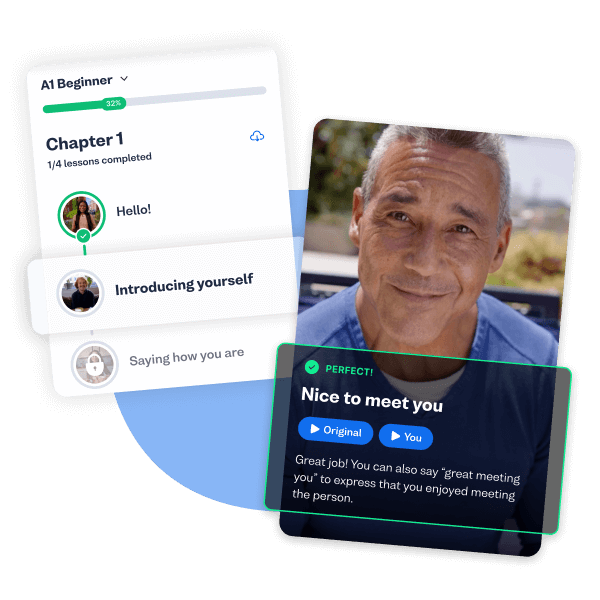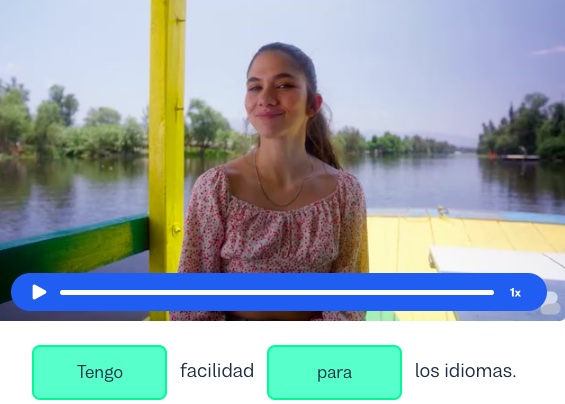The Best Age to Learn a New Language
Your learning environment and opportunities are more important than the age you start a new language
I want to learn...
You’ve all heard that starting young leads to quicker progress and better outcomes with a new language. In fact, it isn’t as clear as that. Children have some advantages to language learning. But so do more mature learners.
It doesn’t matter how old you are. Anyone can learn a new language. There is no best age to get started. Your opportunities to learn and the learning environment are more important than the age you start.
Let’s take a look at why.
The best age to learn a language: What the research says
There’s been a lot of research done into the best age to learn a new language. The critical period hypothesis (CPH) is one of the most well-known. CPH says that to learn a language to a native level, you must start learning it before you’re nine years old. These first nine years are the critical age for learning a language. Believers in CPH claim that age and acquisition negatively correlate with each other. As age increases, the likelihood of reaching native-level proficiency decreases.
But it’s not a universally accepted theory. And there is no consensus about when the cutoff age is. Research into second language learning and age is full of contradictory ideas.
Here are a few takeaways from well-respected research that show how contested this topic can be:
-
Anyone can learn a language at any age. What’s most important is creating a favorable environment.
-
More mature learners make quicker progress at the beginning, but their ceiling might be lower.
-
People’s ability to learn grammar and language structures is strongest until 17.4 years old.
-
Teenagers are more efficient language learners than young children.
Why it’s easy for kids to learn a new language
Despite the disagreements about CPH, children clearly have some advantages for learning a new language — but they're not all biological.
-
When young children learn languages, it’s unconscious. They’re not aware they’re learning a language. This implicit learning helps them remember new language rules. Adults on the other hand are fully aware they’re learning a language. This means they’re more likely to translate a new language into their native one. Interference from their first language can get in the way of learning a new language.
-
Children can hear more individual sounds than adults. A baby can distinguish between the sounds of different languages but adults can’t. Let’s look at an example. Korean adults often have difficulties with the f sound in English. They often pronounce it as a p — like pish and chips. Korean babies though can distinguish between those two sounds with no problem.
-
Children are less afraid of making mistakes. One big reason for language learners to not speak out is the fear of making mistakes. Kids don’t have this fear to the same extent. That means they’re more likely to speak in the new language without shyness or nerves.
-
Children have better opportunities to learn. Schools all over the world offer immersion in a second or third language. Children who attend such schools spend all day interacting and learning, but not in their native language. Adults with jobs and responsibilities don’t have the same chances to immerse themselves in a new language.
You’re not too old to start learning a new language
Soon you will be able to say “I have a skill for languages.” in Spanish and say “Tengo facilidad para los idiomas.” when you start learning with Busuu! Forget age and master Spanish or other languages you want to learn, with online courses crafted by language experts, our community of millions of native speakers, and more.
Adults can learn languages too
It’s not only children who have language learning advantages. Let’s take a look at some of the benefits of being older when learning a new language:
-
Adults can concentrate. Learning a new language can be a long and bumpy process. Being able to concentrate and have patience is a huge advantage adults have.
-
Adults are better at explicit learning. This means they can focus on language features like grammar, vocabulary, and pronunciation. Conscious noticing of language features is one of the keys to second language acquisition so this is a huge advantage.
-
Adults have pre-existing knowledge to refer back to. Deeper knowledge of their first language helps adults make sense of new languages. Adding this to the problem-solving skills and general knowledge adults have means they have lots of tools they can rely on to help them out with some tricky language.
Tips for adults who want to learn a new language
Luckily for adults only two of the advantages kids have are biological and impossible to change. A change in mindset can help you be less afraid of making mistakes. And recreating immersion learning in daily life can increase your opportunities to learn. Here are some tips to help you learn a new language — no matter how old you are.
-
Immerse yourself. This is easier than it sounds — you don’t need to join a fancy immersion school. This could be as simple as listening to a podcast while you’re cooking. Think of it like background music. The podcast isn’t your main focus but your brain is aware of the language. You can do the same with TV shows, movies, or music. You don’t need to understand everything. What’s important is you’re spending time getting used to the language.
-
Make it fun. Adults have got so many things to do. So many responsibilities. And so many distractions. It’s easy to start a new language and lose motivation. To avoid this, make your learning fun. You could join a group class or find a language exchange partner. You could play word games. Or you could re-read your favorite books in your new language. The more fun it is, the likelier you are to see the process out to the end.
-
Embrace the grind. Accept that it isn’t easy to learn a new language. But enjoy the process. And remember, some of the most valuable learning happens when you fail. So don’t chase perfection and don’t expect a smooth ride. Embrace the difficulties instead.
-
Put yourself out there. As an adult, you need to make opportunities to practice a new language. This might mean getting out of your comfort zone. Join language exchanges, spend time in immigrant communities, and go overseas. Practice opportunities won’t fall into your lap — you need to put yourself out there and search for them.
-
Take chances. You need to be brave to learn a new language. Kids aren’t as afraid of looking stupid. They don’t worry about being perfect or accurate. So instead of thinking accuracy is everything, have fun and embrace making mistakes.
-
Use Busuu. You can connect with 120+ million native speakers and you have plenty of opportunities to practice your new language. You also get online courses in 14 different languages.You can access language learning courses wherever you are on your mobile device.
Anyone can learn a new language, at any age
Learning a new language is challenging and worthwhile. You’re never too old to get started and make progress. Get started today with Busuu, the language learning app. Learn 14 languages through expert-crafted online courses, and millions of native speakers ready to help.
Recommended articles
- Months of the Year in English: Names & Pronunciation
- Possessive Pronouns to Tell Who Owns What in English
- Regular Verbs in Spanish: 100 You Need to Know
- Learn Korean Online: Study with Free Courses & Lessons
- Passé Composé: Master the French Past Tense
- Spanish Language-Learning App
- Definite Articles in English: Definition and Examples
- French Indirect Object Pronouns: A Quick Guide
- How to Give Directions in English: What You Need to Know
- Learn Spanish for Travel with this Travel Course
- How to Order Food in Japanese: A Step-by-Step Guide
- Six of the Best Jobs for Language Learners
New articles
- 86 Examples of Common English Abbreviations
- 25 Common French Verbs And Their Conjugation
- Correlative Conjunctions in English: A Quick Guide
- The Ultimate Guide to French Conjugation of Verbs
- Learn Arabic Online: Study with Free Courses & Lessons
- Free English Language Course: Learn Online
- 17 Ways to Say Thank You in Japanese
- A Quick Guide to Spanish Direct Object Pronoun
- 13 simple ways to say “no” in French
- Learn How to Say and Write Colors in Spanish
- Vous in French: Usage in Speaking and Writing
- Master Italian Words for Food with This Guide

